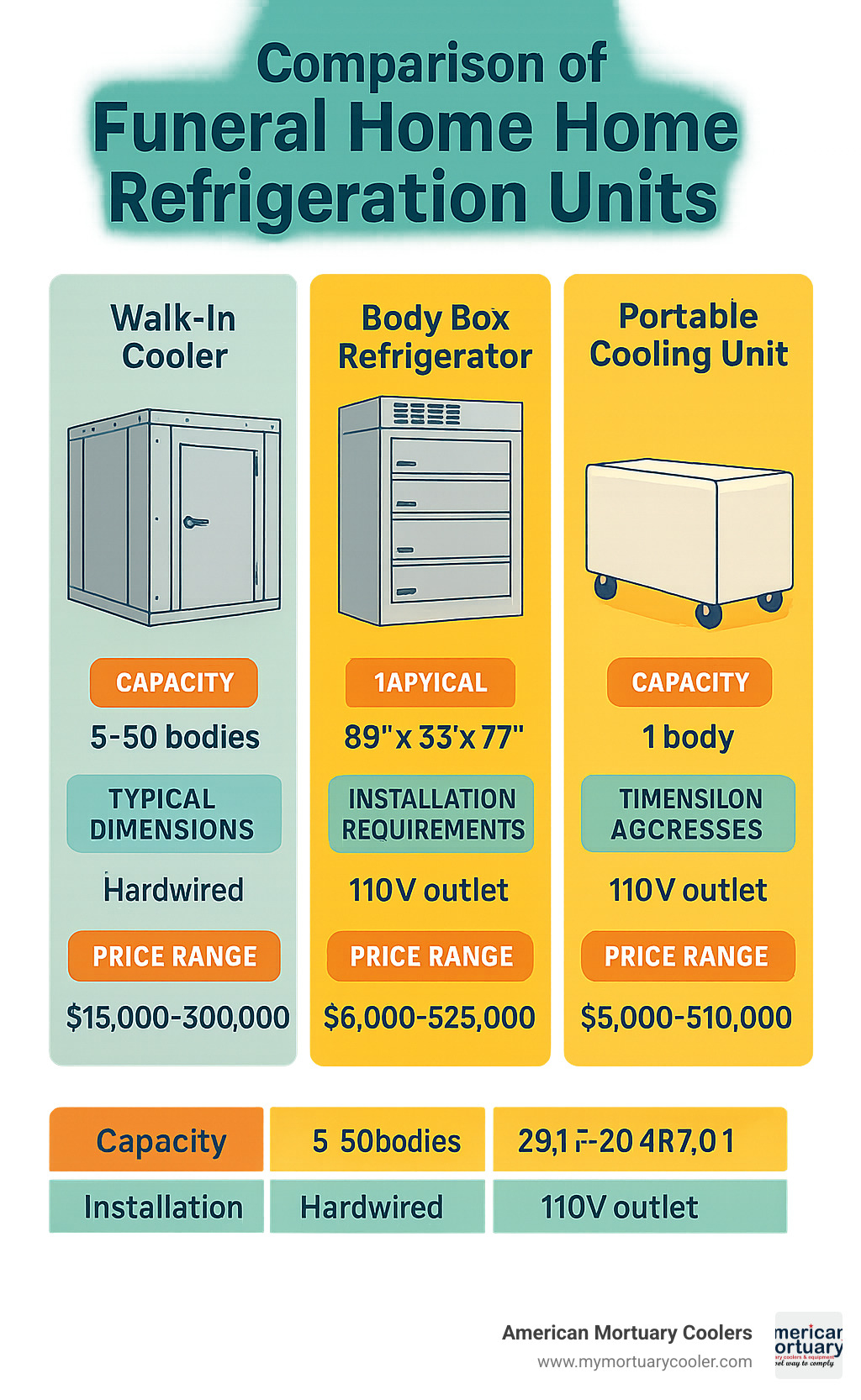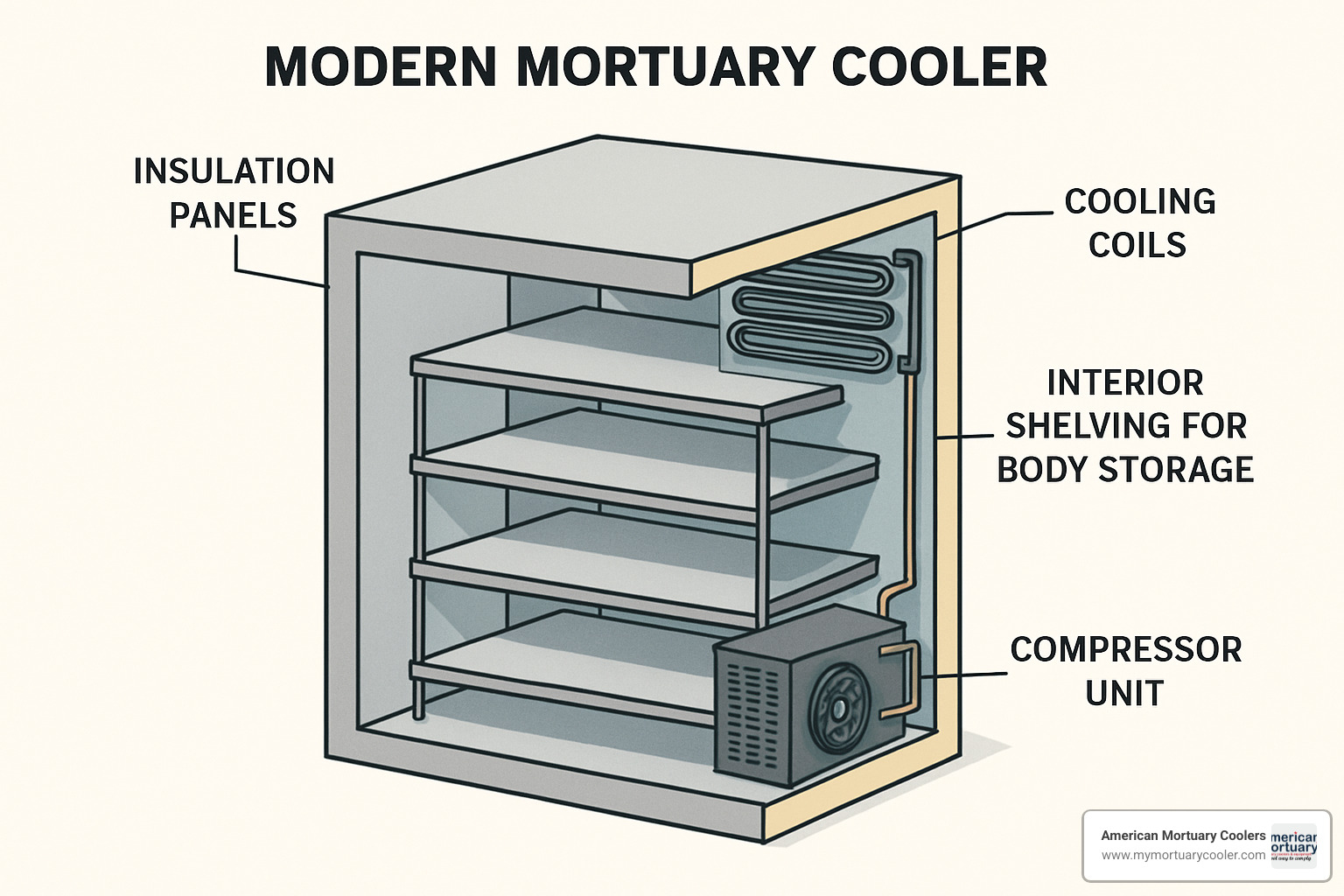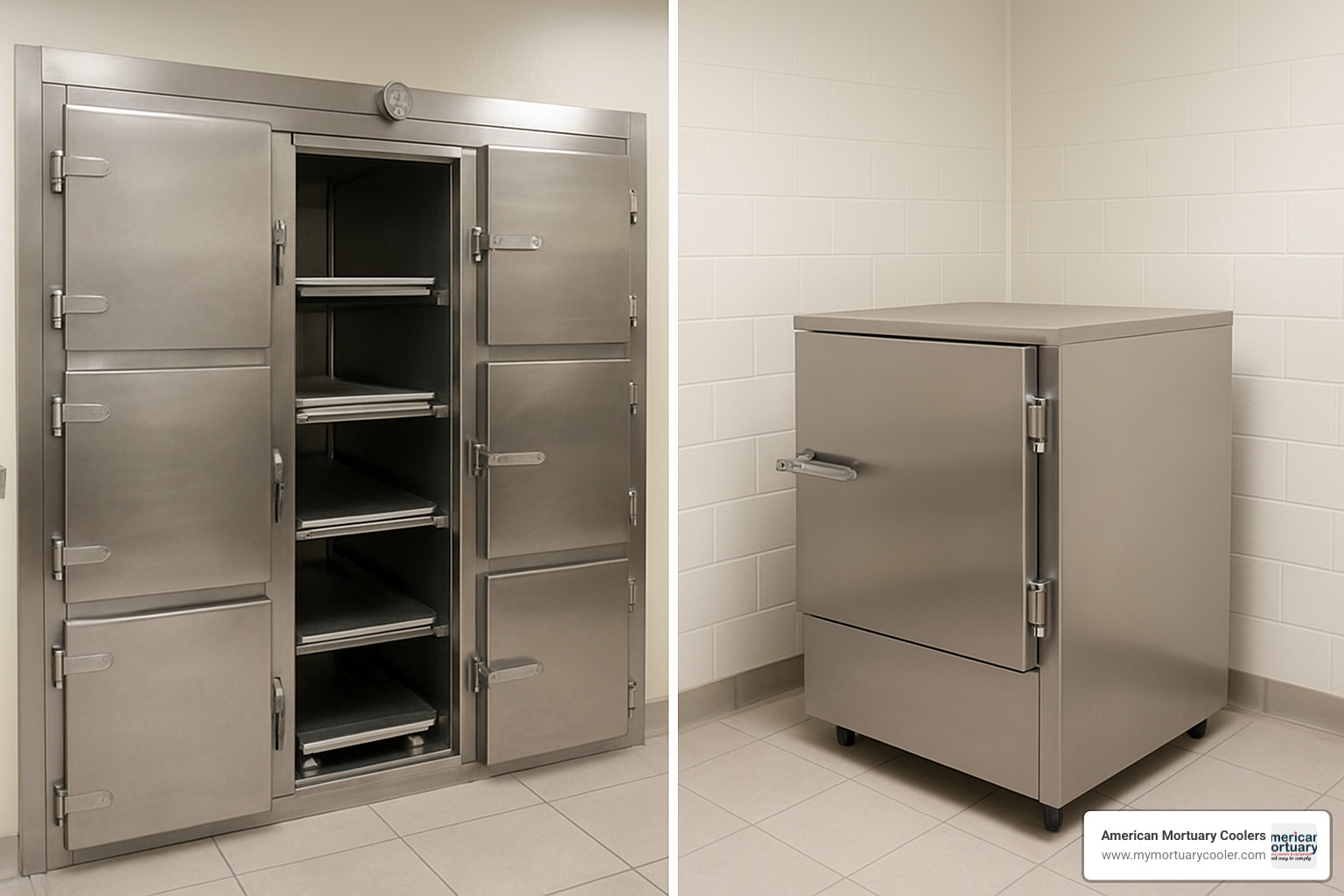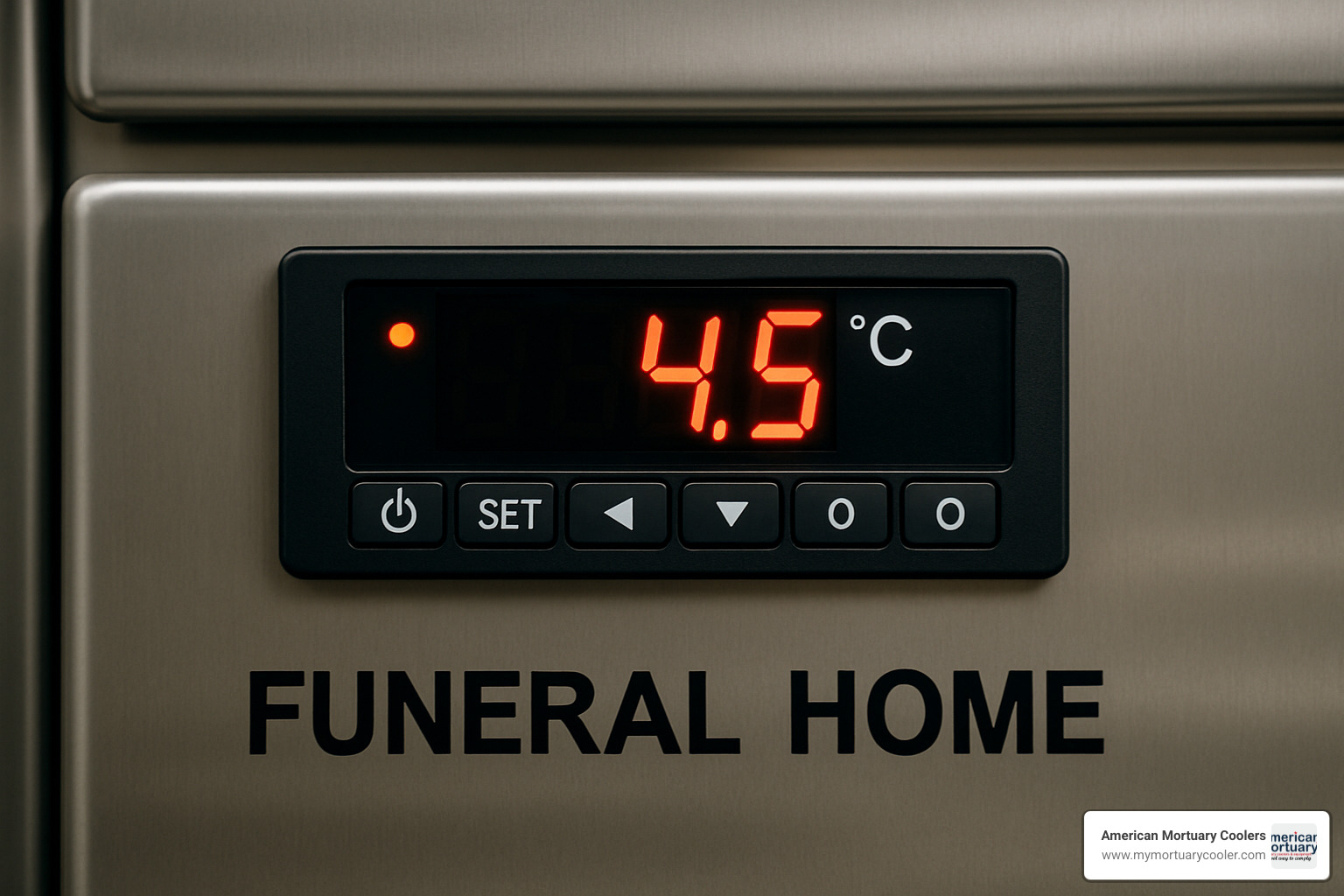The Critical Role of Proper Body Preservation
Funeral home refrigeration units are the unsung heroes of the funeral industry. These specialized cooling systems preserve human remains at temperatures between 2°C and 6°C (35.6°F to 42.8°F) until final arrangements can be completed. Think of them as the gentle guardians that maintain dignity during life's most sensitive transition.
| Funeral Home Refrigeration Basics |
|---|
| Temperature Range: 2-6°C (35.6-42.8°F) |
| Main Types: Walk-in coolers, body box refrigerators, portable units |
| Capacity Options: 1-50 bodies |
| Standard Features: Self-contained refrigeration, digital temperature control, easy-access storage |
| Price Range: $5,799 (1-body) to $32,995+ (8-body) |
Preserving the deceased isn't just about showing respect—though that's certainly important. It's a fundamental public health requirement and a regulatory obligation for funeral homes nationwide. Whether you run a cozy family-owned chapel or a busy regional mortuary, reliable refrigeration isn't optional—it's essential.
Today's funeral home refrigeration units come in all shapes and sizes to fit your specific needs. The small family funeral home might find a compact two-body unit perfect for their typical caseload, while larger operations often require walk-in coolers that can accommodate dozens of remains during busy periods or emergency situations.
What makes these units special? Unlike the refrigerator in your kitchen, mortuary coolers are thoughtfully designed with features that respect both the deceased and those who care for them. Heavy-duty shelving systems make transferring remains safe and dignified. Precise temperature controls ensure optimal preservation conditions. Antimicrobial interior finishes maintain the highest standards of hygiene, while energy-efficient insulation (typically 4 inches thick) keeps operating costs reasonable.
Most funeral homes handle around 113 cases annually, making properly sized refrigeration a critical business decision. The good news? Most units are designed for simple installation, with many plugging into standard 110V outlets—no special electrical work required.
Here at American Mortuary Coolers, we've helped countless funeral directors across the nation select the perfect cooling systems for their unique needs. We understand that your refrigeration equipment needs to be as reliable as your commitment to the families you serve.

Funeral home refrigeration units terminology can sometimes be confusing. To learn more about specific options, check out our detailed guides:
Understanding Funeral Home Refrigeration Units
When a loved one passes away, their dignity continues to be paramount. That's where funeral home refrigeration units come in—specialized cooling systems designed with one crucial purpose: preserving the deceased with respect and care until final arrangements can be completed.

These aren't your standard kitchen refrigerators. Funeral home refrigeration units are thoughtfully engineered marvels that maintain precise temperatures between 2-6°C (35.6-42.8°F)—the sweet spot for slowing natural decomposition processes that begin shortly after death.
The science is straightforward but essential. After passing, our bodies begin changing almost immediately. Bacteria naturally present begin to multiply, enzymes start breaking down tissues, and without intervention, these processes accelerate rapidly. Proper cooling creates an environment where these natural processes slow dramatically, giving families precious time to gather, make decisions, and say goodbye without urgency.
Inside these specialized units, a carefully designed cooling cycle works continuously:
- Cool air circulates through the cabinet, drawing heat away from remains
- A compressor-driven refrigerant system removes this heat efficiently
- Digital controls maintain the perfect temperature range
- Humidity levels are managed to prevent excessive moisture
Why funeral home refrigeration units are mandatory
There's a reason funeral home refrigeration units aren't optional in most states. These requirements aren't arbitrary red tape—they're rooted in practical necessities that benefit everyone.
First and foremost, it's about public health. Proper refrigeration prevents the potential spread of pathogens from decomposing remains, protecting both funeral home staff and the wider community. It's a quiet but critical public health measure happening behind the scenes.
Many families today choose alternatives to traditional embalming, whether for environmental, religious, or personal reasons. Without funeral home refrigeration units, these choices would be severely limited. Natural burial options, green funeral practices, and religious traditions that prohibit embalming all depend on proper refrigeration capabilities.
Modern families are often scattered across the country or globe. When a loved one passes, bringing everyone together takes time—sometimes days or even weeks. Refrigeration provides the flexibility needed for these contemporary realities.
As Lyn Anderson from Watford General Hospital notes: "We have a range of Flexmort equipment and opted for Flexmort's Aircool system as it is easy to assemble, has large A4 pockets to hold body identification documents and fully rollered racking."
Common terms for funeral home refrigeration units
The funeral industry, like many specialized fields, has its own vocabulary. You might hear these systems called by various names depending on who's talking:
In funeral homes, mortuary refrigerator is the most commonly used term, focusing on the dignified purpose these units serve. Hospital settings often prefer morgue cooler or morgue freezer (the latter operating at lower temperatures for extended preservation).
Smaller facilities might refer to their units as body storage cabinets, while medical and educational contexts typically use cadaver storage units. The larger walk-in varieties are sometimes called mortuary cold chambers, and you might occasionally hear the colloquial term body box for smaller cabinet-style units.
Understanding these different terms helps when researching options or speaking with suppliers, as they may categorize their products using varied terminology. At American Mortuary Coolers, we're familiar with all these terms and can help you steer the options regardless of what you call them.
More info about funeral refrigeration options
The Three Main Types & Their Use Cases
When selecting funeral home refrigeration units, you'll typically be looking at three main categories. Here at American Mortuary Coolers, we've helped funeral homes across all 48 contiguous states find just the right cooling solution for their unique situations.

Walk-In Coolers for large-scale storage
Walk-in mortuary coolers are like the workhorses of our industry. They're perfect for those busy funeral homes that need to handle multiple cases at once, hospital morgues needing substantial capacity, or sadly, disaster response centers managing mass fatality situations.
What makes these systems special is their flexibility and capacity. They feature modular construction with prefabricated panels that can be assembled right at your location. Depending on the configuration, they can accommodate anywhere from 5 to 50 bodies, which is remarkable when you think about it.
Most walk-in units use cantilever racking systems that make efficient use of the available space. You can also customize these units with specific door placements, interior lighting options, and alarm systems to match your facility's needs.
A standard 10' x 10' walk-in cooler runs about $13,995 – an investment that pays dividends in operational efficiency. These units comply with the Federal Energy Independence & Security Act of 2007, featuring high-density polyurethane insulation panels that are typically 4 inches thick for optimal temperature control.
One funeral director from Southern California told us something that stuck with me: "With the 8'x12' CoolBot Walk In Cooler for about $5K, I've got capacity for twenty-five people. I've become the largest refrigeration facility for human remains in Southern California because of CoolBot. It is literally a game changer in the funeral industry."
Body-Box & Upright Units for small facilities
For small to medium-sized funeral homes, body-box refrigerators and upright units are often the perfect fit. These units typically hold between 1-8 bodies, making them ideal for facilities with moderate case volumes.
What makes these units so popular is their convenience. Most require only a standard 110V outlet – truly plug-and-play installation. They have self-contained refrigeration systems, so there's no need for external condensers or special plumbing. Many can even be fitted with casters, allowing you to reposition them as needed.
Our most popular model at American Mortuary Coolers is our 2-body roll-in cooler, priced at $6,445. With external dimensions of 7'3" W × 3'¾" L × 5'2" H, it offers an excellent balance of capacity and space efficiency. We can deliver these units directly to funeral homes throughout our service regions.
For those looking for premium features, many body-box units offer telescoping slide rails. These allow for smooth, effortless access to the deceased without the physical strain of lifting – something your staff will certainly appreciate after a long day.
Portable & Temporary Systems
The newest kids on the block in funeral home refrigeration units are portable and temporary systems. These innovative solutions address needs for flexibility and rapid deployment that traditional fixed units simply can't match.
Pop-up mortuary systems offer lightweight, collapsible cooling chambers that can be set up quickly. Disaster response units can be deployed rapidly during mass fatality incidents. And many funeral homes use these systems as supplemental capacity during unexpectedly busy periods.
The Flexmort AirCool is a perfect example of this category's versatility. It can be set up or dismantled in minutes, offers capacity options from 4 to 24 bodies, and even comes in specialized bariatric versions supporting individuals up to 256kg (40 stone). Plus, it's compatible with standard mortuary trolleys, making it seamlessly integrate with your existing equipment.
These portable systems are particularly valuable if you serve rural areas with limited permanent infrastructure, if your facility is undergoing renovation of permanent cooling systems, or in specialized settings like field hospitals and military deployments.
Temperature, Compliance & Safety Essentials
Getting the temperature right isn't just a technical detail for funeral home refrigeration units – it's the heart of what these systems do. Think of it as the difference between preservation with dignity and, well, the alternative nobody wants to deal with.
Temperature Requirements
When it comes to keeping things cool, not all refrigeration is created equal. Standard mortuary coolers operate best between 2-6°C (35.6-42.8°F), which hits that sweet spot for slowing decomposition without freezing tissues. For longer-term storage needs, mortuary freezers maintain temperatures below -2°C (28.4°F).
"Most families make arrangements within a few days, which is why our standard coolers at the 2-6°C range are our most popular units," explains our technical director at American Mortuary Coolers. "But we always recommend having a plan for those situations when you might need extended preservation."
Preparation rooms have their own temperature requirements – typically 15-18°C (59-64.4°F). This balance keeps the environment comfortable for staff while still slowing decomposition processes during preparation work.

Regulatory Compliance
Running a funeral home means navigating a sea of regulations, and your refrigeration needs to check all the right boxes:
OSHA has specific workplace safety standards for staff operating refrigeration equipment. These cover everything from proper handling procedures to emergency protocols if something goes wrong.
When shopping for units, look for NSF certification, which ensures they meet public health and sanitation standards – crucial when you're dealing with deceased individuals and potential infection control issues.
Energy efficiency matters too, with the Federal Energy Independence & Security Act of 2007 (EISA) setting specific standards for walk-in coolers and freezers. This isn't just good for your electric bill – it's required by law.
Don't overlook UL approval for electrical components and ASTM E84 testing for insulation materials. These safety standards protect your staff, your facility, and ultimately, your business reputation.
Environmental Controls
Temperature is just the beginning of the preservation story. Proper air circulation makes a huge difference in performance – preparation rooms typically need 5-6 complete air changes per hour to maintain air quality and temperature consistency.
Humidity control plays a surprising role in preservation quality. Too much moisture accelerates decomposition, which is why quality units manage both temperature and humidity levels.
"One mistake we see new funeral directors make is focusing solely on the temperature reading," says our lead technician. "But if humidity isn't controlled properly, preservation quality suffers dramatically."
High-quality insulation panels with effective vapor barriers prevent condensation inside the unit – a problem that can lead to moisture buildup and potential contamination issues. At American Mortuary Coolers, all our walk-in panels feature 4-inch high-density polyurethane insulation that exceeds EISA requirements.
Proper ventilation around the condenser unit ensures efficient operation. We've seen too many units installed in cramped spaces without adequate airflow, leading to overworked compressors, higher energy bills, and shortened equipment lifespan.
The bottom line? Temperature matters enormously, but it's the complete environmental control system that delivers the consistent preservation quality your families deserve.
More info about temperature of morgue coolers
Buying Guide: Capacity, Features, Costs & Suppliers
Choosing the right funeral home refrigeration unit feels a bit like finding the perfect pair of shoes – it needs to fit just right, serve your specific needs, and last for years to come. At American Mortuary Coolers, we've helped hundreds of funeral directors steer this important decision, and I'd love to share what we've learned along the way.
Capacity Planning
When funeral directors ask me about sizing, I always start by having a heart-to-heart about their day-to-day operations. Think about your facility like this:
How many deceased loved ones are typically in your care at once? Do you see predictable busy seasons (sadly, winter months often bring higher volumes in many regions)? Are you planning to grow your services in the coming years? And practically speaking, where will this unit live in your facility?
One piece of wisdom I share with everyone: plan for at least twice your average daily case count. This gives you breathing room when the unexpected happens – whether it's a holiday weekend or, heaven forbid, a local tragedy.
Key Features to Consider

The difference between a good refrigeration unit and a great one often comes down to thoughtful features that make your daily work easier and more dignified.
Rack systems matter tremendously for staff comfort and safety. Roller racks make loading and unloading gentler on your back, while telescoping slide rails provide smooth, quiet access to the deceased. In larger walk-ins, cantilever systems help you maximize every inch of space.
Construction quality isn't something to compromise on. Look for stainless steel interiors that will stand up to years of cleaning protocols. The industry standard for insulation is 4-inch high-density polyurethane – it maintains temperature efficiently while keeping energy costs reasonable. And those vapor-proof LED lights with external switches? They're not just convenient; they prevent condensation issues inside the unit.
Temperature control technology has come a long way. Digital thermostats with external displays let you monitor conditions without opening doors. Modern alarm systems alert you to any temperature fluctuations before they become problems. Some directors even appreciate remote monitoring capabilities for peace of mind after hours.
Accessibility features might seem minor until you're using them daily. Consider whether side-loading or end-loading doors work better for your space. Internal safety releases on all doors aren't just good practice – they're essential for staff safety. And if you're choosing a roll-in model, don't forget to ask about ramp options.
Energy efficiency pays dividends over the life of your unit. Look for EISA-compliant insulation, modern compressor technology, and quality door seals. These features not only reduce your monthly utility bills but also extend the life of your equipment.
Cost Considerations
Investing in quality funeral home refrigeration units means understanding the full financial picture. Here's what to expect:
The purchase price varies widely based on capacity and features. A single-body roll-in cooler starts around $5,799, while our popular 2-body model begins at $6,445. For larger needs, an 8-body unit with telescoping slide rails might run up to $32,995. Walk-in coolers, like our standard 10' x 10' model, typically start around $13,995.
Installation costs depend on what you choose. Most body-box units are refreshingly simple – just plug into a standard 110V outlet and you're ready to go. Walk-in coolers usually require professional assembly, adding $1,500-$3,000 to your investment. Some facilities need site preparation work before installation, especially for larger units.
Don't forget about operating costs over time. Energy consumption varies by size and usage patterns. Many directors find preventative maintenance contracts ($500-$1,000 annually) well worth the peace of mind. Extended warranty options can also protect your investment for years to come.
Selecting a Supplier
Finding a trustworthy supplier for your funeral home refrigeration unit makes all the difference in your experience. Here's what I recommend considering:
Manufacturing location often indicates quality control standards. American-made units typically offer better materials and craftsmanship, plus easier access to replacement parts down the road.
Delivery capabilities matter tremendously. Can they actually get the unit to your location without excessive fees? At American Mortuary Coolers, we're proud to offer direct delivery across all 48 contiguous states from our locations in Johnson City TN, Atlanta GA, Chicago IL, Columbia SC, Dallas TX, Los Angeles, New York NY, Pittsburgh PA, and our regional centers.
Installation support varies widely between companies. Some drop the unit at your door and wish you luck, while others (like us) offer assembly and setup services to ensure everything works perfectly from day one.
Warranty terms should cover at least 5 years on mechanical components. Read the fine print about what's covered and what isn't.
Customer references tell the real story. Don't hesitate to ask for testimonials from similar facilities in your region.
More info about choosing body coolers
Innovations to watch in funeral home refrigeration units
The funeral home refrigeration industry isn't standing still. Several exciting innovations are making these essential tools better than ever:
Antimicrobial coatings like SmartProtec® are changing the game for interior surfaces, inhibiting bacterial growth and making cleaning routines more effective. For facilities concerned about infection control, these coatings provide an extra layer of protection.
IoT monitoring has entered the mortuary world, with systems that alert your smartphone if temperatures fluctuate outside safe ranges. This technology provides tremendous peace of mind, especially for smaller operations without 24/7 staffing.
CoolBot retrofits represent an interesting alternative technology that modifies standard air conditioners for mortuary cooling. While not right for everyone, they can offer significant cost savings in certain applications.
Energy management systems with smart controllers reduce power consumption during off-peak hours without compromising cooling performance. These systems often pay for themselves within a few years through reduced utility bills.
Modular expansion options allow your refrigeration capacity to grow alongside your business. These systems are designed with future flexibility in mind – a smart choice for facilities anticipating growth.
Selecting reputable manufacturers & avoiding pitfalls
After helping hundreds of funeral homes with their refrigeration needs, I've seen what can go wrong when corners are cut. Here's how to protect yourself:
Verify certifications before purchasing. All components should meet UL, NSF, and EISA standards – don't just take the salesperson's word for it.
Check lead times realistically. Some manufacturers have extended production delays that could leave you waiting months for delivery. Ask for specific timeframes and get them in writing.
Understand warranty exclusions thoroughly. Some policies exclude labor costs or require using authorized service providers who might not be available in your area.
Beware hidden fees that can blindside your budget. Delivery, lift-gate service, and assembly often incur additional charges that weren't mentioned in the initial quote.
Confirm after-sales support will be available for the life of your unit. Parts availability and service support matter tremendously when you're dealing with such an essential piece of equipment.
The right funeral home refrigeration unit represents more than just a purchase – it's a partnership that supports your mission of providing dignified, respectful care. We at American Mortuary Coolers would be honored to help you find the perfect solution for your unique needs.
Installation, Maintenance & Common Pitfalls
Proper installation and maintenance of funeral home refrigeration units are essential for reliability, longevity, and compliance with health regulations. At American Mortuary Coolers, we provide comprehensive guidance to ensure your equipment performs optimally for years to come.

Installation Considerations
Getting your cooler set up properly starts with thoughtful site preparation. You'll want to ensure there's plenty of breathing room around the condensing unit—think of it like giving your equipment personal space to do its job efficiently. Before installation day arrives, take time to verify your floor can handle the weight, especially for our larger units.
The good news is that most of our funeral home refrigeration units only need a standard 110V electrical outlet—no special wiring required! This plug-and-play approach makes installation much more straightforward than many people expect.
When choosing between floorless and floored models, consider your daily workflow. Floorless units make it easier to roll bodies in and out, but they do require an NSF-approved cove base to meet sanitation requirements. It's a small detail that makes a big difference in both convenience and compliance.
Most of our body-box units arrive unassembled to keep shipping costs reasonable. Don't worry though—assembly is straightforward with basic tools like a cam-lock wrench, power drill, socket wrench, 6' level, rubber mallet, and tape measure. As one of our customers recently told us after installing their 2-body unit: "The assembly was straightforward—took about an hour with two people. The cam-lock system makes it much easier than I expected."
Maintenance Requirements
Think of your funeral home refrigeration unit like your car—regular maintenance prevents unexpected breakdowns when you need it most. We recommend quarterly condenser coil cleaning to keep things running smoothly. Just like changing your home's air filters, this simple task dramatically improves efficiency and extends equipment life.
Door gaskets deserve special attention too. These rubber seals keep the cold air in and warm air out, so inspect them regularly and replace at the first sign of wear or damage. Temperature calibration should be verified periodically to ensure your unit maintains the proper 2-6°C range, and if your model has a drainage system, make sure it's flowing freely.
For cleaning, gentle is best. Use non-abrasive, hospital-grade disinfectants on interior surfaces after each use. Harsh chemicals can damage stainless steel and antimicrobial coatings, potentially shortening the lifespan of your investment. Remember to document all cleaning procedures—your local health department may request these records during inspections.
We strongly recommend establishing a relationship with qualified refrigeration technicians for annual comprehensive inspections. These professionals can spot potential issues before they become problems, saving you both money and potential disruption to your services.
Delivery & Logistics
When you order from American Mortuary Coolers, we want delivery day to go smoothly. Before your unit arrives, ensure there's adequate access for delivery trucks to reach your facility. If you don't have a loading dock or forklift available, we offer lift-gate service for an additional $75 to safely lower your unit to ground level.
You'll have the option for self-assembly or professional installation—whichever best suits your team's skills and schedule. Our standard units typically have a lead time of 2-4 weeks, while custom configurations may take a bit longer. We'll keep you updated throughout the process so you can plan accordingly.
Operator Training
Even the best equipment needs knowledgeable operators. Make sure your staff receives proper training on temperature monitoring procedures and safe loading and unloading techniques. Every team member should understand emergency protocols for power outages or equipment failures, and know exactly what documentation is required for regulatory compliance.
We provide comprehensive operation manuals with all our units, but we're also just a phone call away if questions arise. Our support team has helped funeral directors across all 48 contiguous states master their equipment.
More info about state regulations
Frequent mistakes when operating funeral home refrigeration units
Over our years serving the funeral industry, we've noticed some common missteps that can lead to problems with funeral home refrigeration units. Being aware of these can save you headaches and repair costs.
Overloading is perhaps the most frequent issue we see. When you exceed the designed capacity, you restrict airflow and put extra strain on the cooling system. It's tempting to squeeze in "just one more" during busy periods, but this short-term solution often leads to long-term problems.
Proper airflow management is critical to performance. Keep vents and condenser coils clear of obstructions. Something as simple as storing boxes too close to the unit can impede its ability to release heat, making the system work harder than necessary.
Pay attention to warning signs like unusual noises, temperature fluctuations, or frost buildup. These are your unit's way of telling you something's not right. One funeral director shared this cautionary tale: "We learned the hard way about condenser cleaning. A year of dust accumulation led to a system failure during our busiest summer month. Now we have quarterly maintenance scheduled without fail."
Door discipline matters more than you might think. Even brief periods with doors left open can significantly impact temperature stability. Make sure all staff understand the importance of proper closure—that satisfying "thunk" sound of a well-sealed door is music to a refrigeration technician's ears!
Maintaining proper documentation isn't just good practice—it's often required by law. Temperature logs provide proof that remains were properly preserved and can protect your business in case questions arise.
Finally, resist the urge for DIY repairs on sealed refrigeration systems. Unless you're a certified technician, these attempts can void warranties and potentially create hazards. When in doubt, call the professionals—that's what we're here for.
Frequently Asked Questions about Funeral Home Refrigeration Units
What temperature should funeral home refrigeration units maintain?
When it comes to preserving the deceased with dignity, temperature control is everything. Funeral home refrigeration units need to maintain a sweet spot between 2°C and 6°C (35.6°F to 42.8°F). This range hits the perfect balance – cold enough to significantly slow decomposition processes but not so cold that it causes freeze damage to tissues.
Some families need more time for arrangements or have special circumstances that require longer-term storage. In these cases, specialized units can operate at slightly lower temperatures, around -2°C (28.4°F).
In preparation rooms, we typically recommend a bit warmer – about 15-18°C (59-64.4°F). This creates a comfortable environment for funeral directors while still keeping decomposition at bay. It's all about finding that balance between practicality and preservation.
Most of our units at American Mortuary Coolers come with easy-to-read digital temperature controllers mounted on the exterior. This means you can monitor and adjust settings without opening the unit and disrupting the cooling environment. Many funeral directors particularly appreciate the alarm features that alert staff if temperatures drift outside the optimal range – giving you peace of mind, especially overnight.
How do I estimate the right size and capacity for my facility?
Sizing your funeral home refrigeration units correctly is crucial – too small and you'll face capacity issues during busy periods; too large and you're paying for cooling space you rarely use.
When funeral directors call us about sizing, I always ask them to consider their actual needs based on several factors. First, look at your average daily caseload based on your annual figures. Then, think about those predictable busy periods – perhaps winter months or specific times when your community historically experiences higher death rates.
Don't forget to factor in your growth plans. Are you expanding services or expecting your community to grow in the next 5-10 years? The refrigeration unit you install today should serve you well into the future.
Space constraints are practical considerations too. Measure your available installation area carefully, including clearance needed for doors and proper ventilation around the unit.
Many of our more experienced funeral home customers follow this simple formula:
Minimum capacity = (Average daily cases × 2) + 1
This built-in buffer helps handle unexpected surges. For example, if you typically have 2 cases per day, a 5-body capacity would give you appropriate flexibility.
At American Mortuary Coolers, we've designed options ranging from single-body units for the smallest facilities to expansive walk-in coolers capable of storing 50+ remains. We can even create custom configurations when standard options don't quite fit your unique situation.
What is the typical total cost (purchase, installation, operation) per body position?
Understanding the full investment in funeral home refrigeration units helps with better financial planning. Let's break down the real costs per body position:
The initial purchase price typically ranges from $2,900 to $4,500 per position, depending on whether you choose a basic unit or one with premium features like telescoping rails. Installation costs vary too – body box units often need minimal setup (just plug into a standard outlet), while walk-in units might require professional assembly costing $0-$500 per position.
But purchase price is just the beginning. Annual operating costs include electricity ($100-$250 per position), regular preventative maintenance ($75-$150 per position), and setting aside funds for eventual repairs (about $50-$100 per position annually).
The good news? These units are built to last. With proper care, you can expect 15-20 years of reliable service. Our warranty coverage includes 15 years on panels and doors, with 5 years on mechanical components.
When you calculate the total cost of ownership over a 15-year lifespan, you're looking at approximately $5,000-$8,000 per body position, or about $330-$530 per year per position. That breaks down to roughly a dollar or two per day per position – a reasonable investment for such an essential aspect of funeral service.
To make this investment more manageable, American Mortuary Coolers offers several financing options, including programs with 0% down payment and no payments for the first 90 days on qualified purchases. This helps funeral homes of all sizes access the equipment they need without straining cash flow.
More info about choosing body coolers
Conclusion
Funeral home refrigeration units are more than just equipment—they're an essential part of providing dignified care while meeting regulatory requirements. Throughout this guide, we've walked through everything from basic cooling principles to advanced features that can make your facility more efficient.
When you step back and look at what matters most, a few key points stand out:
First, proper refrigeration isn't optional in our industry. Maintaining those critical temperatures between 2-6°C isn't just about following rules—it's about giving families peace of mind knowing their loved ones are being cared for properly. It's about earning trust.
Second, choosing the right system for your particular needs makes all the difference in your day-to-day operations. Whether you're running a small family-owned funeral home or managing a large regional facility, having refrigeration that matches your case volume means less stress and better service.
Third, modern refrigeration options support the growing diversity of preferences we see in death care today. From families choosing natural burial to those with religious requirements that preclude embalming, having reliable refrigeration expands the meaningful choices you can offer.
Lastly, when you invest in quality equipment and maintain it properly, you're making a decision that will serve your business for years to come. Those 15-year warranties on structural components aren't just numbers—they represent thousands of families you'll be able to serve with confidence.
At American Mortuary Coolers, we've helped funeral homes of all sizes find their perfect refrigeration solution. We understand that every facility has its own unique challenges and requirements. That's why we focus on crafting custom solutions that precisely match what you need.
Our team delivers directly to funeral homes across our service regions—from Johnson City to Los Angeles, Chicago to Dallas, and everywhere in between. We cover the Midwest, Northeast, Rocky Mountains, Southeast, Southwest, and Pacific regions with personalized service that larger suppliers simply can't match.
I'd love to hear about your specific situation and help you find the refrigeration solution that will serve your business and your families for years to come. When you're ready to explore your options, we're here to help with straightforward advice and solutions built specifically for funeral professionals like you.
















